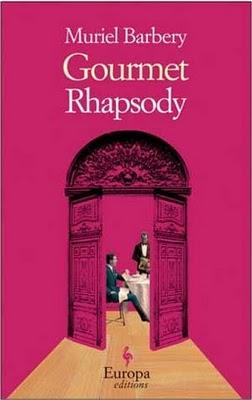Gourmet Rhapsody

Food has become a very controversial subject, many arguing that education levels, income, and race unfairly dictate the availability of fresh foods and vegetables in low-income American neighborhoods. Though Muriel Barbery (The Elegance of the Hedgehog) does not focus specifically on these issues in her recent novel Gourmet Rhapsody, the division between the working class and the wealthy as it pertains to food and quality of life is often glaringly apparent in the story.
The premise of the novel is simple: The world’s greatest fictional food critic, Pierre Arthens, is dying and wants one last bite, but what that bite is, he does not know. Barbery uses beautiful, sumptuous language to describe the critic’s most fond food memories as he attempts to pinpoint a single flavor that constitutes “the first and ultimate truth” of his life.
Gourmet Rhapsody mostly takes place in Arthens’ bed, where he’s been confined since receiving word that he is dying. Every other chapter is narrated by the food critic and focuses on a specific food from his past such as tomatoes, mayonnaise, and bread. Be warned: Arthens is not a likable character; he is self-important, condescending, and rude. Think Vogue/New York Times food writer Jeffrey Steingarten, but with more clout, French flair, and venom. Arthens is a man who repeatedly cheats on his wife, drives countless chef’s aspirations to hell with glee, and who refers to his children as “monstrous excrescences.”
Thankfully, the chapters of Barbery’s book that aren’t focused on Arthens' quest for the mystery flavor are narrated by others who have known the critic in some capacity. Here the concierge, who has spent his life dutifully tending to Arthens' children and guests and catering to his every whim gets to weigh in, as does the housekeeper who’s looked over the critic’s home for the past thirty years. It is with these characters that the class divisions are perfectly illustrated; they are simple, hard-working people who don’t understand their boss’ cruelty or his quest for one more bite, despite a life filled with the best food imaginable. To them, it seems a hell of a lot like gluttony and in many ways, it is.
We also hear from Arthens' family members, such as his daughter Laura, who has grown cold and hateful of the father who's been more concerned with stuffing his face and chasing after women than with being a loving parental figure. We also hear from his wife, who is aware of his indiscretions but who’s stayed by his side for whatever reasons women in similar situations do. She is pained and frantic, desperate to keep her husband alive and eager to help him find that last, elusive taste.
It would be incredibly easy to hate Arthens, but what saves him from being completely unlikeable is his overwhelming love and passion for food. I have to believe that a man who can describe a rustic meal as “two thin slices of raw, smoked ham, silky and supple along languid folds, some salted butter, and a hunk of bread” has to have some redeeming qualities.
In the end, Arthens does get his last bite and it’s quite unexpected, though fitting. At one time or another, all of us come to long for the simple things of our youth, things we thought we’d forgotten until one day we get a whiff of them or a glance at them while walking down the street. This unique form of human longing and emotion is what ties us together, despite wealth, class, or race, and Barbery does a beautiful job of making this apparent through the use of food, all the way down to the last page.